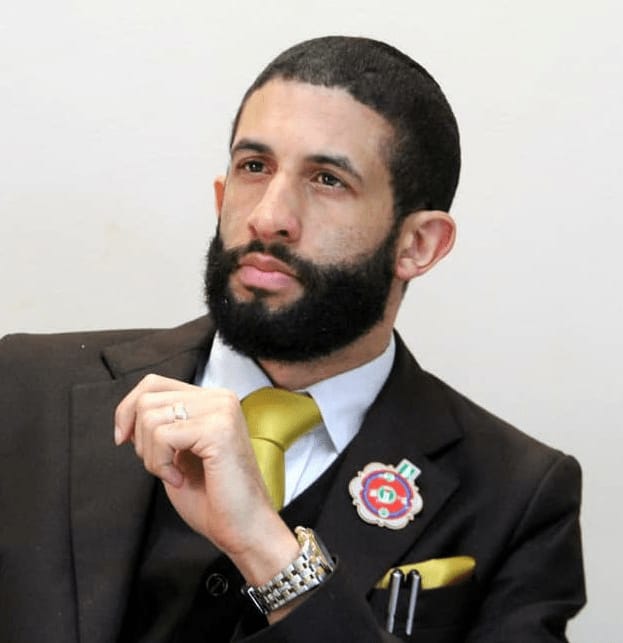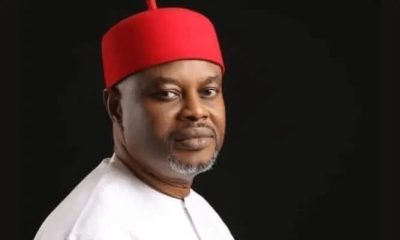OPINION
Ngelale’s Resignation: Out Of Frustration Or Principle?

BY ISAAC ASABOR *
The resignation of a prominent political figure is frequently fraught with speculation, controversy, and differing interpretations. Ajuri Ngelale resigned from President Bola Tinubu’s administration, exemplifying this trend. As Ngelale walks away from the responsibilities he once enthusiastically accepted, many people wonder if his resignation was motivated by frustration or a strong principle.
Ajuri Ngelale’s name is not unfamiliar to Nigerian political observers. As one of Tinubu’s media aides, Ngelale established himself as a dedicated and articulate supporter of the administration’s policies. He skilfully defended government actions in the media and showed loyalty to the ruling party, the All Progressives Congress. His rise to prominence was rapid, owing to his eloquent defence of policies that were frequently criticised by the opposition and the general public.
However, as the saying goes, “public office is not permanent,” and his resignation has undoubtedly highlighted the fact that political positions and statuses are temporary and subject to change, similar to the concept that in politics there are “no permanent friends, no permanent enemies, but permanent interests.” This highlights the fluidity of political relationships and the importance of adaptable strategies. Regardless, the reasons for his resignation are still unclear, although several theories have emerged.
There is speculation that Ngelale’s departure was motivated by frustration with the government’s internal workings. Despite his strong public support for the administration’s policies, Ngelale, like many Nigerians, may have become disillusioned with the slow pace of reforms and the government’s inability to meet the people’s expectations. The nation’s current economic challenges, which include inflation, high unemployment, and rising poverty, may have been a tipping point. His departure could reflect his own dissatisfaction with how things were handled within Tinubu’s administration.
According to speculation, Ngelale may have resigned due to a disagreement with the APC’s leadership. After years of working closely with the party, he may have found himself at odds with certain decisions that did not align with his personal values. Resigning in such a situation would be a statement of principle, demonstrating that he refused to compromise his beliefs for the sake of his career.
Another possibility is that Ngelale’s resignation was caused by external pressure. Working in such a high-profile position entails dealing with political opponents as well as navigating the demands of powerful government officials. It is possible that these forces put Ngelale in a position where he could no longer hold office. If so, his departure could be interpreted as a matter of necessity rather than genuine frustration or principle.
Politics is frequently a chess game, and resignations can be part of a larger strategy. Ngelale may be preparing for a future political move that would necessitate his departure from his current role. By resigning, he positions himself as someone who is not bound by a specific administration, potentially giving him more flexibility for future engagements in Nigerian politics.
Given the preceding context, it is appropriate to state that the line between frustration and principle is frequently blurred in political resignations. However, based on Ngelale’s record, it is reasonable to believe that his resignation is a combination of the two. On the one hand, the frustration of defending an administration under extreme pressure may have taken its toll. On the other hand, his decision to step down may be a strong statement about sticking to his convictions and refusing to be a part of a government that cannot keep its promises.
In fact, Ajuri Ngelale’s resignation reflects deeper undercurrents in Nigeria’s political scene. It emphasises the difficulties that political advisers and policymakers face while navigating a government riddled with contradictions and growing public dissatisfaction. If key figures such as Ngelale leave their positions, it may indicate broader dissatisfaction within the administration, indicating that all is not well at the top.
For the general public, Ngelale’s departure may demonstrate that even those in positions of power are not immune to the frustrations of the average Nigerian. As the country struggles with economic challenges, political instability, and a restless populace, the resignation of such a key figure is likely to fuel further debate about the country’s future direction.
At this point, it would be fair to say that whether Ajuri Ngelale resigned out of frustration or principle, his departure marks a watershed moment in President Tinubu’s administration. It raises broader questions about the government’s internal dynamics, including whether key figures within the ruling party are losing faith in the system they helped build. As Nigeria faces mounting challenges, it is unclear whether other resignations will follow, and if so, what this means for Nigerian politics in the future.
-
CRIME4 years ago
PSC Dismisses DCP Abba Kyari, To Be Prosecuted Over Alleged $1.1m Fraud
-
FEATURED4 years ago
2022 Will Brighten Possibility Of Osinbajo Presidency, Says TPP
-
FEATURED2 years ago
Buhari’s Ministers, CEOs Should Be Held Accountable Along With Emefiele, Says Timi Frank
-
BUSINESS & ECONOMY2 years ago
Oyedemi Reigns As 2023’s Real Estate Humanitarian Of The Year
-
SPORTS2 years ago
BREAKING: Jürgen Klopp Quits Liverpool As Manager At End Of Season
-
SPORTS2 years ago
Could Liverpool Afford Kylian Mbappe For €200 million? Wages, Transfer Fee
-
ENTERTAINMENT2 years ago
Veteran Nigerian Musician, Basil Akalonu Dies At 72
-
FEATURED2 years ago
Tribunal Judgement: Peter Obi Warns Of Vanishing Electoral Jurisprudence, Heads To Supreme Court
-
BUSINESS & ECONOMY2 years ago
Oyedemi Bags ‘Next Bulls Award’ As BusinessDay Celebrates Top 25 CEOs/ Business Leaders
-
FEATURED4 years ago
2023 Presidency: South East PDP Aspirants Unite, Demand Party Ticket For Zone





























